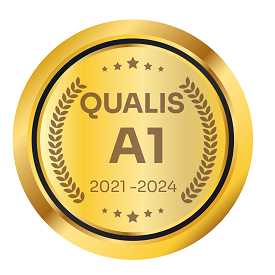La pedagogía del arte como medio para el desarrollo de la motivación educativa de los estudiantes – futuros profesores
DOI:
https://doi.org/10.22633/rpge.v25iesp.1.14975Resumen
El artículo está dedicado al estudio del impacto de la pedagogía del arte en el desarrollo de la motivación educativa de los estudiantes. La pedagogía del arte es una dirección innovadora, cuyo propósito es crear una nueva metodología cognitiva, superar las barreras psicológicas del pensamiento, construir la interacción entre un docente y un alumno sobre la base de la reflexión, la autoorganización educativa y creativa para la intelectualidad. y desarrollo creativo. Esta tecnología es especialmente relevante en la capacidad de una integración del arte en el contexto educativo para resolver tareas profesionales y pedagógicas de la práctica educativa moderna. El propósito del artículo es estudiar la influencia de las técnicas de la pedagogía del arte en el desarrollo de la motivación educativa de los estudiantes - futuros profesores. El artículo discute el papel y los datos de un análisis comparativo de la planificación temática para el estudio de la asignatura “Historia de la Pedagogía y la Educación” en combinación con las técnicas de la pedagogía del arte. También describe el curso y los resultados del experimento sobre el desarrollo de la motivación educativa de los estudiantes utilizando estas técnicas. Los métodos de investigación fueron: análisis teórico de la literatura científica, generalización, encuesta y experimento pedagógico. Los resultados de la investigación se pueden recomendar a los profesores universitarios y universitarios en la formación de estudiantes, futuros profesores.
Descargas
Citas
BROPHY, J. E. Motivating students to learn. Routledge, 2013.
BRYSON, C.; HAND, L. The role of engagement in inspiring teaching and learning. Innovations in education and teaching international, v. 44, n. 4, p. 349-362, 2007.
DAVIS, J. H. Why our high schools need the arts. New York, NY: Teachers College Press, 2011.
DECI, E. L.; RYAN, R. M. Cognitive evaluation theory. In Intrinsic motivation and self-determination in human behavior (pp. 43-85). Springer, Boston, MA. (1985).
EWING, A. R. Making a difference in learning through arts-rich pedagogy. 2018.
IGNATYEVA, I. The trend of technologisation of modern education (the use of humanitarian technologies). Procedia-Social and Behavioral Sciences, v. 214, p. 606-613, 2015.
KARKINA, S. V.; FAJZRAHMANOVA, L. T.; GLUZMAN, A. V. Subject-oriented approach in the professional formation of the future music teacher. Journal of History Culture and Art Research, v. 6, n. 4, p. 1071-1077, 2017.
KARKINA, S. V.; NURGAYANOVA, N. K.; KAUR, M. Traditional music and poetry of the tatars-mishars: Modern forms of existence. Humanities & Social Sciences Reviews, v. 7, n. 6, p. 477-480, 2019.
KARKINA, S. V.; SINGH, B.; VALEEVA, R. A. Signature pedagogies of music learning by the Means of MOODLE across Russian and Indian Approach. In: INTERNATIONAL CONFERENCE ON TECHNOLOGICAL ECOSYSTEMS FOR ENHANCING MULTICULTURALITY, 7., 2019, León. Proceedings […]. León, Spain, 2019. p. 575-581
KATASHEV, V. Pedagogy of higher education. Kazan, 2005. 395 p.
KAYUMOVA, R.; DYGANOVA, E.; BATYRSHINA, G.; BAGHDASARYAN, A. Formation of visual culture in teenagers by teaching them photographic art. International Journal of Innovative Technology and Exploring Engineering, v. 9, n. 1, p. 5130-5133, 2019.
MAKAROVA, K. Prospects for the Development of Art Pedagogical Education: the Case of the New Profile “Art of the book”. Procedia-Social and Behavioral Sciences, v. 214, p. 305-318, 2015.
PAVILL, B. Fostering creativity in nursing students: a blending of nursing and the arts. Holistic Nursing Practice, v. 25, n. 1, p. 17-25, 2011.
RIEGER, K. L.; CHERNOMAS, W. M.; MCMILLAN, D. E.; MORIN, F. L. Navigating creativity within arts-based pedagogy: Implications of a constructivist grounded theory study. Nurse Education Today, v. 91, 104465, 2020).
SAEED, S.; ZYNGIER, D. How motivation influences student engagement: a qualitative case study. Journal of Education and Learning, v. 1, n. 2, p. 252-267, 2012.
VALLERAND, R. J.; REID, G. On the causal effects of perceived competence on intrinsic motivation: A test of cognitive evaluation theory. Journal of Sport and exercise Psychology, v. 6, n. 1, p. 94-102, 1984.
WOLTERS, C. A. Advancing achievement goal theory: using goal structures and goal orientations to predict students' motivation, cognition, and achievement. Journal of Educational Psychology, v. 96, n. 2, 236-250, 2004.
Publicado
Cómo citar
Número
Sección
Licencia
Derechos de autor 2021 Revista on line de Política e Gestão Educacional

Esta obra está bajo una licencia internacional Creative Commons Atribución-NoComercial-CompartirIgual 4.0.
Manuscritos aceitos e publicados são de propriedade da Revista on line de Política e Gestão Educacional. É vedada a submissão integral ou parcial do manuscrito a qualquer outro periódico. A responsabilidade do conteúdo dos artigos é exclusiva dos autores. É vedada a tradução para outro idioma sem a autorização escrita do Editor ouvida a Comissão Editorial Científica.











